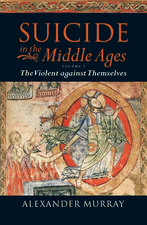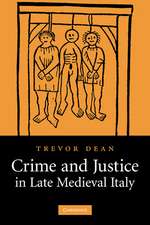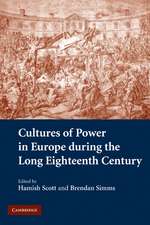Inhumanities: Nazi Interpretations of Western Culture
Autor David B. Dennisen Limba Engleză Paperback – 13 mai 2015
Preț: 248.79 lei
Nou
Puncte Express: 373
Preț estimativ în valută:
47.65€ • 49.09$ • 39.91£
47.65€ • 49.09$ • 39.91£
Carte tipărită la comandă
Livrare economică 24 februarie-10 martie
Preluare comenzi: 021 569.72.76
Specificații
ISBN-13: 9781107521858
ISBN-10: 1107521858
Pagini: 558
Ilustrații: 50 b/w illus.
Dimensiuni: 152 x 228 x 30 mm
Greutate: 0.74 kg
Editura: Cambridge University Press
Colecția Cambridge University Press
Locul publicării:New York, United States
ISBN-10: 1107521858
Pagini: 558
Ilustrații: 50 b/w illus.
Dimensiuni: 152 x 228 x 30 mm
Greutate: 0.74 kg
Editura: Cambridge University Press
Colecția Cambridge University Press
Locul publicării:New York, United States
Cuprins
Introduction; Part I. Foundations of Nazi Cultural History: 1. The 'Germanic' origins of western culture; 2. Voxvolkish; 3. The western tradition as political and patriotic; 4. The western tradition as anti-Semitic; 5. The archenemy incarnate; Part II. Blind to the Light: 6. Classicism romanticized; 7. Intolerance toward enlightenment; 8. Forging steel romanticism; 9. Romantic music as 'our greatest legacy'; Part III. Modern Dilemmas: 10. Realist paradox and expressionist confusion; 11. Nordic existentialists and volkish founders; 12. Music after Wagner; Part IV. 'Holy' War and Weimar 'Crisis': 13. Heralds of the front experience; 14. Weimar culture wars i: defending German spirit from 'circumcision'; 15. Weimar culture wars ii: combating 'degeneracy'; Part V. Nazi 'Solutions': 16. 'Honour your German masters'; 17. The Nazi 'Renaissance'; 18. Kultur at war; Conclusion.
Recenzii
'David B. Dennis's long-awaited study of the metamorphosis of Nazi Kultur during World War II has arrived like a blockbuster. The role that the regime gradually tailored for the finest artists and thinkers to serve a proposed new world order has been researched with the painstaking care of the true scholar, yet reported here with the elegance and thrust of a novelist. The book is more than a good read; it is destined to become a classic.' Glenn Watkins, author of Proof through the Night: Music and the Great War
'This is an ambitious and important book that conveys the immensely depressing conclusion that even intellectual and cultural figures of great creativity and imagination (Dante, Bach, Beethoven) are dangerously malleable in the hands of their interpreters. Scholars, students, and the general public need now look no further than Dennis's book to find a cogent, reliable, and astute assessment of every Nazi attitude toward every canonical cultural figure of the western tradition, and a number of others besides.' Celia Applegate, author of Bach in Berlin
'Dennis's distinctive contribution is to reveal in great detail how the Nazis understood and misunderstood, used and misused, selectively read and then appropriated bits and pieces of the Western tradition. Inhumanities again reminds us that the Nazi regime attacked what we understand to be the core values of the Western tradition. Yet they often did so in the name of defending Western civilization as its intellectuals, scholars, journalists and propagandists understood it. The book is an important advance in the scholarship about Nazi culture. Dennis's tone is restrained yet the impact is powerful.' Jeffrey Herf, author of Jewish Enemy: Nazi Propaganda during World War II and the Holocaust
'One of the most important, authoritative and meticulous studies of Nazi propaganda to date.' The Times Literary Supplement
'… revelatory … lively and incisive.' History Today
'… a very valuable reference for any subsequent scholars on Nazi culture …' Andrew G. Bonnell, European History Quarterly
'The general reader with a passing interest in Nazism or in any of these Nazified German masters will find Dennis's work fascinating and accessible. Researchers of Nazi culture will benefit from Dennis's scholarship for years to come. He should be commended for his labor.' Sewanee Review
'Inhumanities represents a major contribution to the literature on National Socialism. Scholars in that field, as well as those interested in questions of German culture and nationalism, will find in it much to treasure.' Journal of Modern History
'Inhumanities is an essential demonstration of the pivotal role culture played in Nazi conceptions of national and racial identity and an important addition to any campus library.' International Social Science Review
'… with a superb command of the literature, as well as historiographical and terminological issues, Dennis has published a substantial work, whose quality is enhanced by photographs pointedly illuminating his arguments. His book stands among the very best studies of Nazi culture, from the classic work of George Mosse to more recent research of, among others, Michael Kater, Jonathan Petropoulos, Pamela Potter and Alan Steinweis.' Central European History
'David B. Dennis has unearthed and presented in great detail Nazi ways of framing the legacy of several 'great masters' in völkisch and racial terms, thus creating a treasure trove of information on which future scholars can draw.' Riccardo Bavaj, German History
'This is an ambitious and important book that conveys the immensely depressing conclusion that even intellectual and cultural figures of great creativity and imagination (Dante, Bach, Beethoven) are dangerously malleable in the hands of their interpreters. Scholars, students, and the general public need now look no further than Dennis's book to find a cogent, reliable, and astute assessment of every Nazi attitude toward every canonical cultural figure of the western tradition, and a number of others besides.' Celia Applegate, author of Bach in Berlin
'Dennis's distinctive contribution is to reveal in great detail how the Nazis understood and misunderstood, used and misused, selectively read and then appropriated bits and pieces of the Western tradition. Inhumanities again reminds us that the Nazi regime attacked what we understand to be the core values of the Western tradition. Yet they often did so in the name of defending Western civilization as its intellectuals, scholars, journalists and propagandists understood it. The book is an important advance in the scholarship about Nazi culture. Dennis's tone is restrained yet the impact is powerful.' Jeffrey Herf, author of Jewish Enemy: Nazi Propaganda during World War II and the Holocaust
'One of the most important, authoritative and meticulous studies of Nazi propaganda to date.' The Times Literary Supplement
'… revelatory … lively and incisive.' History Today
'… a very valuable reference for any subsequent scholars on Nazi culture …' Andrew G. Bonnell, European History Quarterly
'The general reader with a passing interest in Nazism or in any of these Nazified German masters will find Dennis's work fascinating and accessible. Researchers of Nazi culture will benefit from Dennis's scholarship for years to come. He should be commended for his labor.' Sewanee Review
'Inhumanities represents a major contribution to the literature on National Socialism. Scholars in that field, as well as those interested in questions of German culture and nationalism, will find in it much to treasure.' Journal of Modern History
'Inhumanities is an essential demonstration of the pivotal role culture played in Nazi conceptions of national and racial identity and an important addition to any campus library.' International Social Science Review
'… with a superb command of the literature, as well as historiographical and terminological issues, Dennis has published a substantial work, whose quality is enhanced by photographs pointedly illuminating his arguments. His book stands among the very best studies of Nazi culture, from the classic work of George Mosse to more recent research of, among others, Michael Kater, Jonathan Petropoulos, Pamela Potter and Alan Steinweis.' Central European History
'David B. Dennis has unearthed and presented in great detail Nazi ways of framing the legacy of several 'great masters' in völkisch and racial terms, thus creating a treasure trove of information on which future scholars can draw.' Riccardo Bavaj, German History
Descriere
A revealing account of how Nazi Germany manipulated and mobilized European literature, philosophy, art and music to support its ideological ends.













